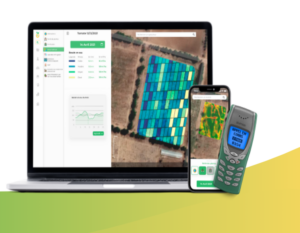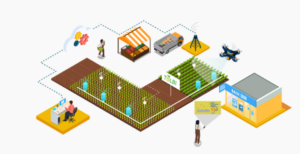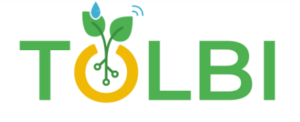Mouhamadou Lamine Kébé, 25 years old, is the winner of the Grand Prix of the President of the Republic of Senegal for digital innovation in 2020 with the start-up Tolbi, which he co-founded in 2019 and runs. Tolbi offers solutions based on artificial intelligence, drones and the Internet of Things that provide real-time information to better manage irrigation water, fertiliser inputs and plant disease detection. He is thus contributing to the development of intelligent and precision agriculture, more resilient to climate change. An engineer who graduated from the Ecole Supérieure Polytechnique de Dakar, he also won an award from the African Telecommunications Union for his Docteur Car robot, which helps caregivers treat Covid patients without risking contamination. He also won the Acting Space 2020 Challenge, co-organised by the Agence Universitaire de la Francophonie, with the Centre spatial Téranga Space. In short, innovation is part of its DNA.
What were the main reasons that drove you to create Tolbi, which means field in Wolof?
80% of the world’s agricultural producers are small farmers. And faced with food insecurity, the technologies that are developed are not adapted to the African social context. They are expensive, most of the time the applications are in French or English and in rural areas, there is not enough Internet connectivity. So we thought it would be useful to develop a technology that would be inclusive, and adapted to the social context, allowing producers to interact in local languages and in real-time, to enable them to increase their farm income and production through smart farming practices.
You are targeting small family farmers, who represent the bulk of agricultural production in Africa. What specific things do you offer them and how can it change their lives?
We provide them with real-time information on good agricultural practices of the day, through phone calls in their local language. For example, we calculate water requirements using satellite images, but also the amount of fertilizer to be applied. We alert them in real-time when a part of their field is under pest attack and suggest treatments to apply. In fact, we allow them to have yield forecasts. We also allow agricultural advisors to accompany them in real-time, remotely, via satellite images. All of this allows them to adopt new intelligent agricultural practices based on technology, increase their production, and reduce their losses of irrigation water.

If I’m a small farmer, all I need is a phone, not even an internet connection?
That’s it, you just need a phone and you’ll get real-time information every day in the local language. That’s what’s interesting about us, it’s calculated in relation to the real needs of the plant. We apply algorithms to satellite images to say this is how much water the plant needs at the moment.
And have you noticed any notable changes, particularly in the reduction of water use? What impacts have you seen already?
60 to 80% savings in irrigation water and 30% higher yields with such practices if they are applied on a field scale.
So, in the range of tools and services that you offer, you have this SMS system. What else do you offer to small farmers?
It’s a call system because most farmers can’t read. The idea is to make calls that the producer can receive, that he can pick up and hear advice. And if for some reason, the call doesn’t go through, we reschedule the call to make sure the information gets through to the producer.
What else do you offer? Could you tell us about e-Tolbi?
With e-Tolbi, we are looking at a much broader picture, because the issue of agriculture is not just about good practices that farmers could adopt. It also concerns the agricultural advisors who are made available to producers and who are responsible for supporting them, particularly in terms of production and marketing. One of the challenges we face is that we don’t have enough agricultural advisors and they can’t travel every day. With e-Tolbi, we allow advisors to monitor producers in real-time and prioritize their movements and interventions. So, an advisor will be able to know at a distance what the farmer is doing and how he is performing. On a much larger scale, we now allow agencies, so the government, ministries, and the various agricultural departments, to have macro data on statistics in real-time. And they will be able to base themselves on this data to make decisions, particularly in terms of regulating prices, imports and exports, which will be able to better protect farmers and consumers in terms of prices. So it’s really a platform that brings together these three different types of actors, offering them each different interface.

Women farmers have a slightly different approach to digital, they are often less familiar with these technologies. Do you have services that target them more specifically?
With Tolbi, we already target this segment. Telephone operators follow the logic of profitability business models, and so they often do not deploy telecommunications infrastructure and Internet networks in the rural world, which impacts women farmers who do not have access to connectivity in order to use applications. With our voice call interface, we enable these women, especially young women farmers, to benefit from the same information as others who have a smartphone, while being less expensive and much more inclusive.
What ultimately makes your offer so strong is that it is inclusive, that it is simple and that it is done in local languages. Do you do it in Wolof?
Yes, and soon we will also do it in Puular, Serer, Joola and Malinke.
Do you think digital has the potential to attract and convert young people to agriculture? And what would it take to encourage them to turn to agriculture?
Agriculture could be more attractive if it were more mechanical and automatic. I’m thinking of automatic irrigation and tractors, for example. If we add digital applications, and the possibility of greater remote interaction, I think that it could encourage many more young people to turn to agriculture, knowing that it is a guarantee of development and economic emancipation.
What do you think is the comparative advantage of African start-ups over other start-ups?
The comparative advantage that African start-ups have is that they operate in markets that are not saturated like the American and European markets ( where solutions have already been found for most problems). In Africa, there are many more problems to solve. And for start-ups or young people, problems mean opportunities to find solutions and profitable business models…
What should be done to encourage more innovation among young people?
Develop financing mechanisms and adapted tools, such as venture capital and seed financing. Also, encourage investors to take much more risk. In the African markets, investors do not take enough risks with start-ups and this brings in fewer funds and therefore fewer opportunities. We really need to put in a lot of cash and give start-ups the opportunity to develop.
Apart from financing, are there other levers?
Yes, training. Appropriate training. There are a lot of university courses on offer, but most of them are not really adapted to young people leaving university and becoming entrepreneurs. So, we really need to readapt the school curriculum, to put in place other modules, other courses that will make it possible to combine theory and practice, in order to prepare young people to be able to leave training and be employed.
Senegal stands out in comparison with other countries in the region in terms of digital transformation, with know-how that is being exported to the sub-region, particularly in terms of dematerialisation of administrations, digital health, software publishing, etc. What do you think explains the particularity and strength of the Senegalese ecosystem? And how has this ecosystem helped you?
Senegal has been able to create an ecosystem, which we call the ‘Lion Tech’, particularly through the Delegation for Rapid Entrepreneurship (DER), which has been able to establish an umbilical cord between start-ups, investors and incubators. The DER has developed quite a few initiatives, such as taking start-ups and sending them abroad for two months to learn a lot of things. It also acts as a link between the different ecosystems in the sub-region. And it also offers funding. It’s this whole cocktail that makes Senegal the leading country in the sub-region in terms of fundraising.
You have benefited from this ecosystem via the DER, and I also read that you have benefitted from an incubator at the ESP in Dakar, could you tell us more about it?
Schools such as the Ecole Supérieure Polytechnique de Dakar have been able to fit into this framework by setting up incubators and accompanying students from the time they were trained so that today before they go out and create their own business, they can test things and form partnerships between schools in order to set up a solution that solves problems. So, effectively, we are currently incubated at the ESP Forge, which is the ESP Innovation and Entrepreneurship Centre.

Tolbi has just been selected as part of the Google for Startup Advisory Sustainable Development Goals programme, which is a programme designed to give start-ups the means to create and evolve into viable businesses with an impact on one or more of the United Nations’ sustainable development goals. Can you tell us more about this programme? What do you expect from it and how do you see the future of Tolbi?
Thanks to this programme, we have access to monitoring with Google engineers on different themes, be it engineering, management or finance. This allows us to increase our skills and as part of our development, we are in the process of deploying our solutions in different regions of Senegal and the idea now, in 2023, is to export our solutions to other countries in the sub-region, such as Côte d’Ivoire, which we have already started to study, so that farmers can benefit more from our solutions.
One last question, what do you think is the disruptive potential of digital technologies in agriculture? Digital agriculture is about optimisation, but not only that, it is said to disrupt many things. Which ones, in fact?
The disruptive potential is enormous if you take just access to finance, which is a big concern for farmers. Generally, they can’t write business plans to defend their projects. But technology and data can speak for them and allow them to have access to credit, subsidies, and financing, and therefore to have a much more intensive production and a much more sustained income. The other thing is the adoption of smart farming practices adapted to climate change and rainwater scarcity. We really need to reduce losses of irrigation water, but also losses due to pests and so on, and also try to have yield forecasts, in order to make what we call pre-contracts. Digital technologies can make a big difference and allow farmers to have access to all this data and all these practices, thanks to satellite images.
